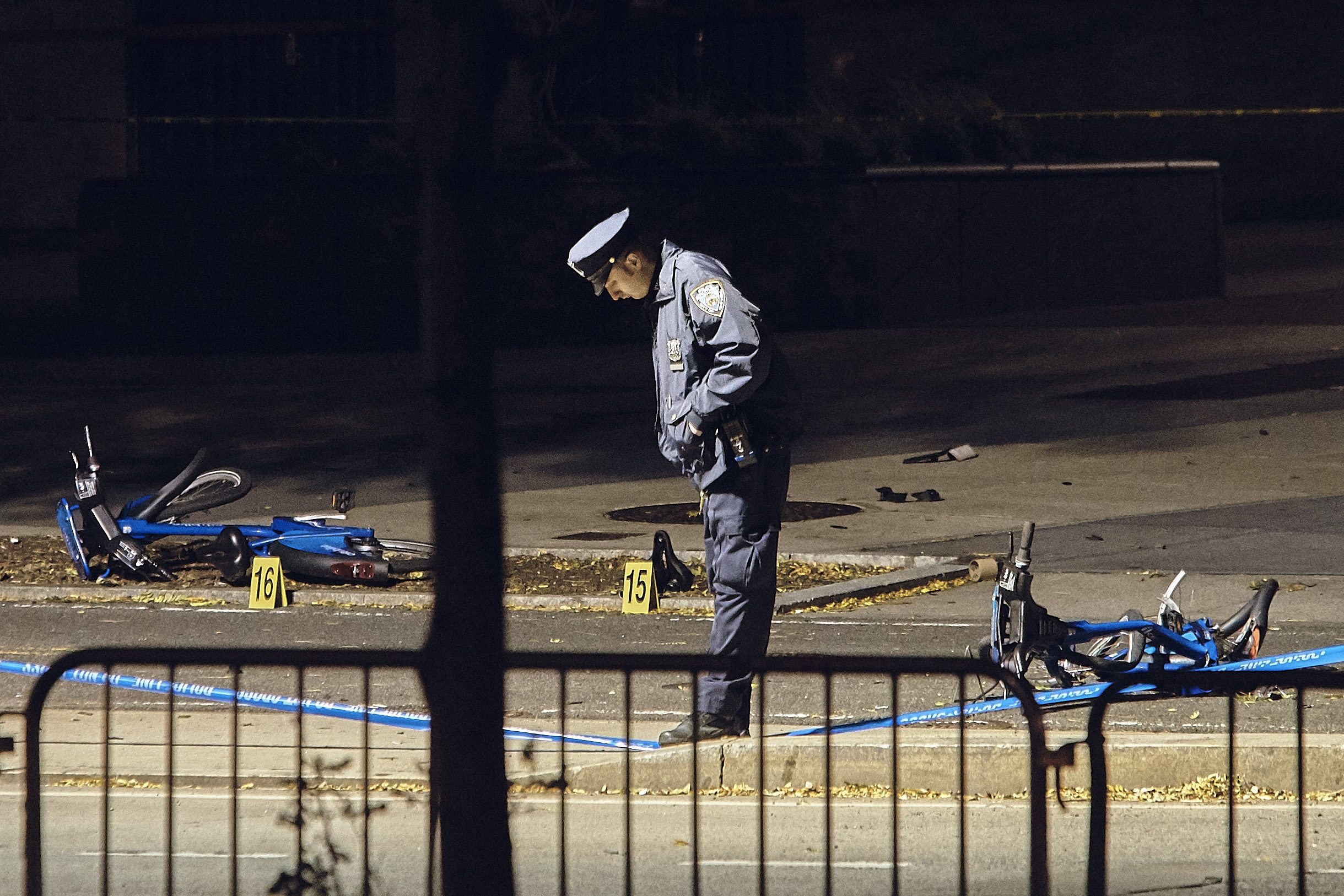
A police officer stands guard next to bicycles that lie on a bike path on Nov. 1, 2017, at the crime scene after a motorist drove onto the path near the World Trade Center memorial, striking and killing several people the day before, in New York. (AP/Andres Kudacki)
Every time a domestic terrorist kills innocent bystanders or heads abroad to join the Islamic State group, experts and pundits try to explain the inexplicable: Why would a person do that?
A new study takes a novel approach to studying radicalization. The findings suggest that it may be the outgrowth of ethnic, racial or religious discrimination.
The study, published in Science Advances, finds an association between anti-Muslim hate and susceptibility to Muslim radicalization in regions of the United States that are poorest and most homogeneous. And it suggests the ethnic diversity of the U.S. may protect against radicalization because people are less prone to pit one group against the other.
The study, done by sociologists at Duke University and a statistician from the University of California, Berkeley, examined internet search data provided by Google in 3,099 counties across the U.S. Specifically, the researchers looked at average monthly search data to see if people in the same geographical areas searched for phrases such as "Muslims are violent" and "How to join ISIS."
The findings, collected between August 2014 and July 2016, suggest pro-ISIS sympathy is most prevalent in communities with high levels of anti-Muslim sentiment.
"One interpretation of this finding is that violent extremism results from the failure of ethnic integration," said Chris Bail, a sociologist at Duke and the study's lead researcher. "People of immigrant background experience a disconnect between their family heritage and their receiving society's culture and thus become vulnerable to extremist narratives."
The researchers also found that anti-Muslim prejudice is particularly high in ethnically homogeneous communities where most people are white and where darker-skinned Muslims stick out, sharpening perceptions of "us" and "them."
The authors note that studies about radicalization are notoriously difficult to undertake since few would-be extremists are likely to identify as such in surveys. People who hate Muslims are also unlikely to betray their true feelings due to social stigma. But the anonymity of the internet can provide researchers with a relatively objective measurement.
After gathering the data, which Google made available to potential advertisers, the researchers superimposed U.S. census data and other surveys to determine the amount of ethnic diversity in each area. The census doesn't ask about religion, but researchers were able to identify ethnic backgrounds. They also measured the overall volume of searches for the term "halal" — the Muslim permissible-food laws — within each county.
The authors suggest their findings may also explain cases of domestic terrorism in which extremists do not identify with Islam, such as the killings of nine black worshippers at a church in Charleston, S.C. The terrorist in that case, Dylann Roof, worried that white men were becoming an imperiled minority.
The authors acknowledge that not all people who search "How to join ISIS" are would-be extremists. They may be law enforcement officers, journalists or even anti-Muslim activists interested in figuring out how to stop the group's recruitment process. Further, many ISIS recruits have been known to join through social media, which the researchers didn't examine.
Google no longer allows search range estimates for phrases such as "How to join ISIS," potentially limiting further study of internet searches. Still, the study may be the first to show an association between religious discrimination and radicalization at the county level.
Advertisement
"I've never seen a cross-national study showing any correlation between racial discrimination and radicalization," said Aziz Z. Huq, a law professor at the University of Chicago who has studied counterterrorism policies that target Muslims. This study, he said, comes closest.
The results, he added, fit other evidence that suggests it's not economic worries that lead people to support anti-immigrant policies and populist politicians but cultural anxiety, particularly the perceived threats from religious or ethnic minorities.
"We know Europeans massively overestimate the proportion of people in their country who are Muslim," Huq said. "It's not the objective fact of 'demographic threat.' What it is is that the presence of the first few outsiders will often trigger a large response."
The researchers acknowledge their study cannot single-handedly explain radicalization. Other studies have suggested that people turn to violent extremism out of sexual frustration, feelings of powerlessness or financial struggles.
"We are not saying ethnic integration is the only predictor of violent extremism," said Bail. "It's almost surely the case that violent extremism has multiple causes. Our contribution is another brick to a building that many different scholars are building."




